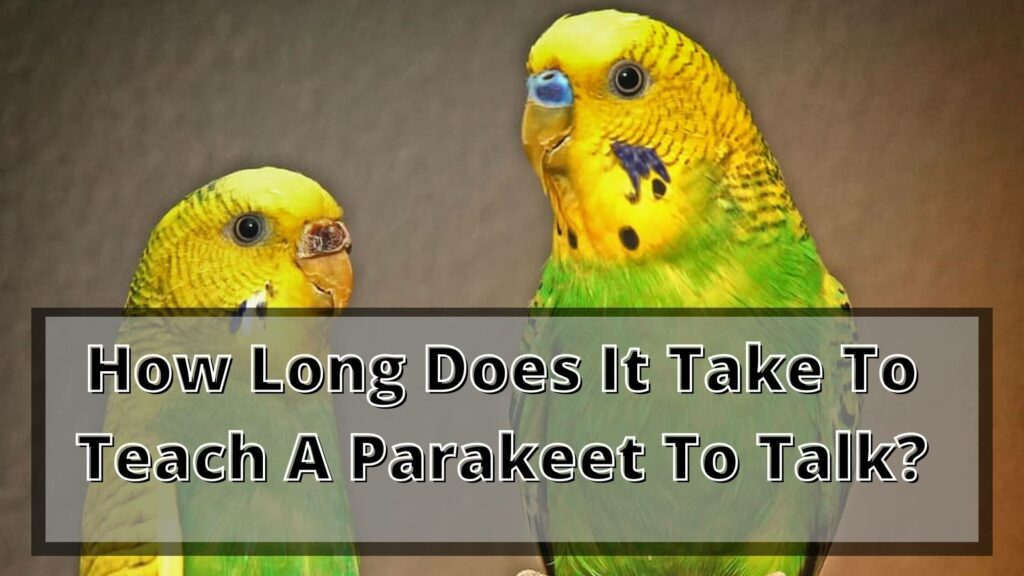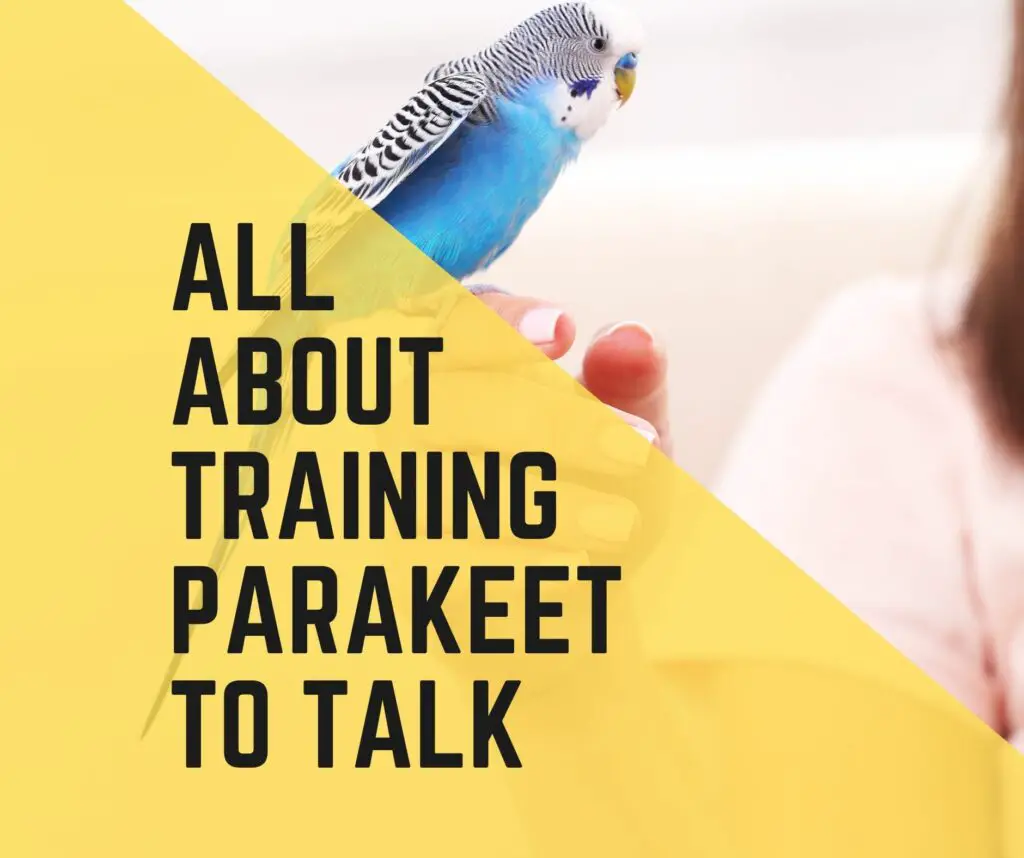Parakeets with bright eyes and beautiful plumbers express their personality through behavior and body language. Additionally, parakeets can learn to talk and mimic words like humans, and they also like to respond to sounds 2 in that environment to communicate.
Some parakeets learn to mimic a particular dish on their own, while others need proper training. In this article, I will help you learn how to train a parakeet to talk. In most cases, parakeets need to learn to speak through established avian speech training methods. Let’s talk about what you should know first before training a parakeet.
9 Things To Know Before Training A Parakeet.
Start Early: Always start early as it sets a good foundation for future training. You should begin training your parakeet in their young life stage.
Set a Good Example: It’s always best to set a good example.
Use Expression When You Talk: Parakeets are known to understand the expression of a particular being, including humans. Using phrases when you talk helps them bond better. Overall, It will make the communication more exciting and fun to respond to for your parakeets.
Be Patient.
Use Word Association.
Provide Positive Reinforcement and Rewards.
Keep Your Parakeet Close to You
Train Your Parakeet During Optimum Talking Times.
Combine Words With Actions: You can combine words with actions like Step Up. We have tried our best to help you guide on how to teach a parakeet to step up.
How Long Does It Take To Teach A Parakeet To Talk?

Depending upon how strong your bond is with your parakeet and its personality, it can take a couple of weeks to an entire year to teach a parakeet to talk. Many things affect a parakeet’s learning ability to speak, and let’s talk about this in detail.
What Affects A Bird Learning How To Talk?
Gender
In general, male parakeets tend to vocalize more than the opposite sex. Therefore, in the mating season, this vocalization helps the male to show courtship behavior to attract females. Male is also very vocal due to the tendency of marking & defending their territory.
Parakeets are very territorial and can do whatever it takes to protect themselves against other parakeets and other birds. One exception is those female parakeets can also talk if they devote effort and time.
Female and male parakeets both tend to speak if you spend a lot of time teaching them. For some species like the African grey parrot, the gender of the bird doesn’t make any difference in whether they can talk or not.
Personality
Just like humans, parakeets can be either extroverts or introverts. This personality can directly influence your parakeet to learn to talk successfully. Some parakeets tend to be shy, making them not interested in learning to talk.
Some parakeets might ever not even speak in their entire life. Being responsible and caring beings, we should accept any Bird we have. A bird should not be owned on one factor only.
Species
Some parakeet species will speak more clearly than others. When adopting a particular parakeet from a pet store or breeders, look for the more talkative species.
Bond
To make and adjust the sound, your parakeet will need to move their tongues forward and backward, including changing its beak opening. Soz it’s a lot of work for your parakeet to do.
If you don’t have a good bonding with your parakeet, consider reading our post: how to bond with parakeets or tell if a parakeet is happy. Things get easier for bonded parakeets because those birds tend to believe their human owner is a part of the flock.
A well-bonded parakeet with its human companion has also been singing and dancing together. To summarise, you should consider having a solid bond with your parakeet before teaching it how to talk.
Age
Like humans, younger birds have a more effortless time learning experience on how to talk. Young birds can learn faster, including parakeets. Consider teaching your parakeet how to talk with their young.
Some birds, including parakeets, can only speak during their critical period when their nervous system is susceptible to certain environmental stimuli. Another reason why age plays an essential factor in the possibility of parakeets learning how to talk is that younger parakeets develop a stronger bond with their first family.
As told earlier, a more robust bird will significantly facilitate the learning process. Let’s talk about how to train a parakeet to talk.
How To Train A Parakeet To Talk?
Know Your Species.
Generally, all parakeet species should be able to learn human words to mimic conveniently if taught with consistency and effort. Make sure to avoid having species that are either adult or wild.
Wild parrot species are very hard to train to talk, and parakeets can be taught to speak over time. Younger ones tend to be very intelligent and can speak or mimic recognizable words, phrases, and even sentences. Try to stick with one species to give a better experience and make the most out of the teaching session.
Start Simple.
Regardless of what kind of parakeet you choose to train, it is best to start with simple words like hello or bye-bye. Or, Hi should be an excellent start for parakeets to learn during their first training session. You can add on other comments later.
As soon as your parakeet starts to mimic and repeat at least one word. ‘Hi’ terms tend to be the most accessible words for birds like parakeets to recognize and learn to imitate. Parakeets are likely to take 32-12 days to mimic one word with time and patience.
Repeat Yourself
Parakeet is going to learn after hearing the word over and over again. So, you will need to be prepared to repeat a particular word hundreds of times before your bird picks it up. Many parakeets learn to mimic environmental sounds like the doorbell, water droplets, telephone, or whistling sounds.
Whereas, some Parakeets can be very shy or never talk. So, in such a case, you should never be disappointed. If your parakeet does not start repeating what you say right away, try teaching him more words or swap.
With effort and consistency, you will get results. If your parakeets mimic even a single word, reward them. Parakeet will soon understand mimicking a sound like a rewarding behavior for both of you.
Speak Clearly
Always try to speak clearly and firmly. Parakeets learn best when the words they hear are enunciated clearly. Avoid mumbling your words. It would help if you faced your parakeet directly and then spoke the word clearly with the firm but same voice tone.
Use the same pitch for a comment each time you say it. Remember that Parakeets often learn repeated words in an enthusiastic high rise. The key to training a parakeet to talk is apparent repetition.
Be Patient With Your Effort
Teaching a bird to talk takes time and effort. It would help if you were patient with your action, which will be worth it in the end. Hearing a parakeet mimicking a word is a greeting itself.
Some even have successfully trained their parakeets to ask for a toy, form a unique sentence all on its own, and communicate their feelings. Parakeets are very trainable and generally playful.

Hi, There and Welcome to BirdsNews.com, is here to help you learn and care about pet birds. and this blog is a journal of everything I’ve learned.

